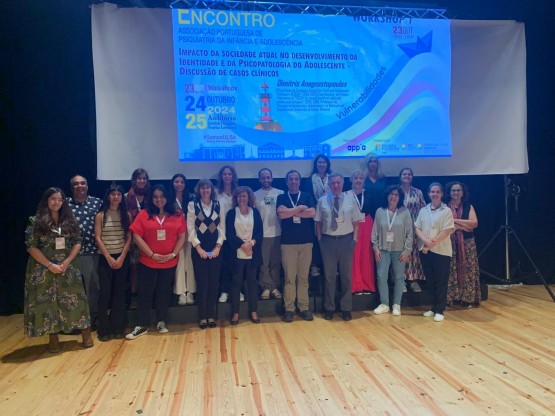XXXIV National Meeting of the Portuguese Association of Child and Adolescent Psychiatry (XXXIV Encontro Nacional da Associação Portuguesa de Psiquiatria da Infância e Adolescência)
By Dr Paula Cristina Correia, Presidente da APPIA (Associação Portuguesa de Psiquiatria da Infância e Adolescência), Portugal.
The meeting took place from 23 to 25 October 2024, in the Auditorium of the Sociedade Filarmónica de Azeitão, Azeitão, Setúbal, Portugal. As president of Portuguese Association of Child and Adolescent Psychiatry (APPIA), I extend my thanks to everyone who attended this meeting and I am thrilled for the well-received event covering such an important and urgent topic as childhood and adolescent mental health.
I want to start by thanking the entire team at the Child and Adolescent Psychiatry Service at ULS Arrábida for all their support, commitment, creativity and dedication in the local organization of this event.
This APPIA meeting brought together experts of national and international prestige who opened a broader perspective on understanding children, young people and families. Mental health has never been talked about so much, nor has mental health in childhood and adolescence been as visible as it is today.

The first photo represents the group that was present at the workshop: "Impact of today's society on the development of adolescent identity and psychopathology - discussion of clinical cases" Dimitris Anagnostopoulos October 23rd 2024.

The second photograph represents Professor Dimitris and Dr Ana Teresa Prata at the National Meeting of the Portuguese Association of Child and Adolescent Psychiatry.
The conference's central theme was "Vulnerabilities", thinking of children as a population particularly vulnerable to mental health risk factors. But within the vulnerable we still have the most vulnerable, such as children in situations of poverty, children who are victims of abuse and neglect, children living in institutions, children with chronic illnesses and we also know that periods of crisis worsen their vulnerability. These children have multiple and cumulative risk factors and very few protective factors. It was important to address these topics as challenges but also as an opportunity to prevent vulnerabilities and promote protective and resilience factors. The need for early referral of mental health risk situations, promoting literacy and networking in mental health was emphasized.
The opening address, “IMPACT OF CURRENT SOCIETY ON IDENTITY DEVELOPMENT AND ADOLESCENT PSYCHOPATHOLOGY”, was given by Professor Dimitris Anagnostopoulos.
We had several functions where vulnerability was addressed like, “VULNERABILITIES AND RESILIENCE AT THE LEVEL OF COMMUNITY MENTAL HEALTH TEAMS”, where the book “Guiding principles for the development of ECSM (community mental health team) in childhood and adolescence” was presented. We still highlight the tables “VULNERABILITIES IN DIVORCE”, “INSTITUTIONS AND YOUNG PEOPLE WITH BEHAVIOR DISORDERS: CHALLENGES AND APPROACHES”, “VULNERABILITIES IN EARLY CHILDHOOD” and “ IMPACT OF VIOLENCE”.
On the second day of conferences, we addressed “CRISIS AND VULNERABILITY SITUATIONS IN ADOLESCENCE”, where crisis consultation and hospitalization in this age group were discussed. The congress ended with Professor Bruno Falissard presentation, “IDENTITY AND MENTAL ILLNESS”.
This article represents the view of its author(s) and does not necessarily represent the view of the IACAPAP's bureau or executive committee.

